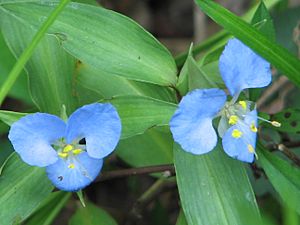Virginia dayflower facts for kids
Quick facts for kids Virginia dayflower |
|
|---|---|
 |
|
| Specimen at the Congaree National Park in South Carolina, United States | |
| Conservation status | |
| Scientific classification | |
| Genus: |
Commelina
|
| Species: |
virginica
|
The Commelina virginica, also known as the Virginia dayflower, is a green plant that grows back every year. It belongs to the dayflower family. You can find it mostly in the middle and southeastern parts of the United States. This plant loves to grow in wet soil.
Most plants in its group have thin, stringy roots. But the Virginia dayflower is special because it has a thick, underground stem called a rhizome. This rhizome helps the plant live for many years.
About the Virginia Dayflower
The famous scientist Carl Linnaeus first described this plant. He wrote about it in his book Species Plantarum in 1762.
Plant Family Tree
Scientists study plants to see how they are related. They look at tiny parts of the plant's DNA. One study looked at the DNA of the Virginia dayflower. It suggested that this plant might be related to two plants from Africa. These are called Commelina capitata and Commelina congesta.
However, the scientists said this connection was not super strong. Even so, these plants do share some cool features.
How It Looks
The Virginia dayflower and C. capitata both have red hairs. You can find these hairs at the top of their leaf sheaths. This is quite unusual for plants in this family.
Also, the Virginia dayflower and C. congesta both have flowers that grow in tight bunches. These flower bunches are on very short stems.
See also
 In Spanish: Commelina virginica para niños
In Spanish: Commelina virginica para niños


